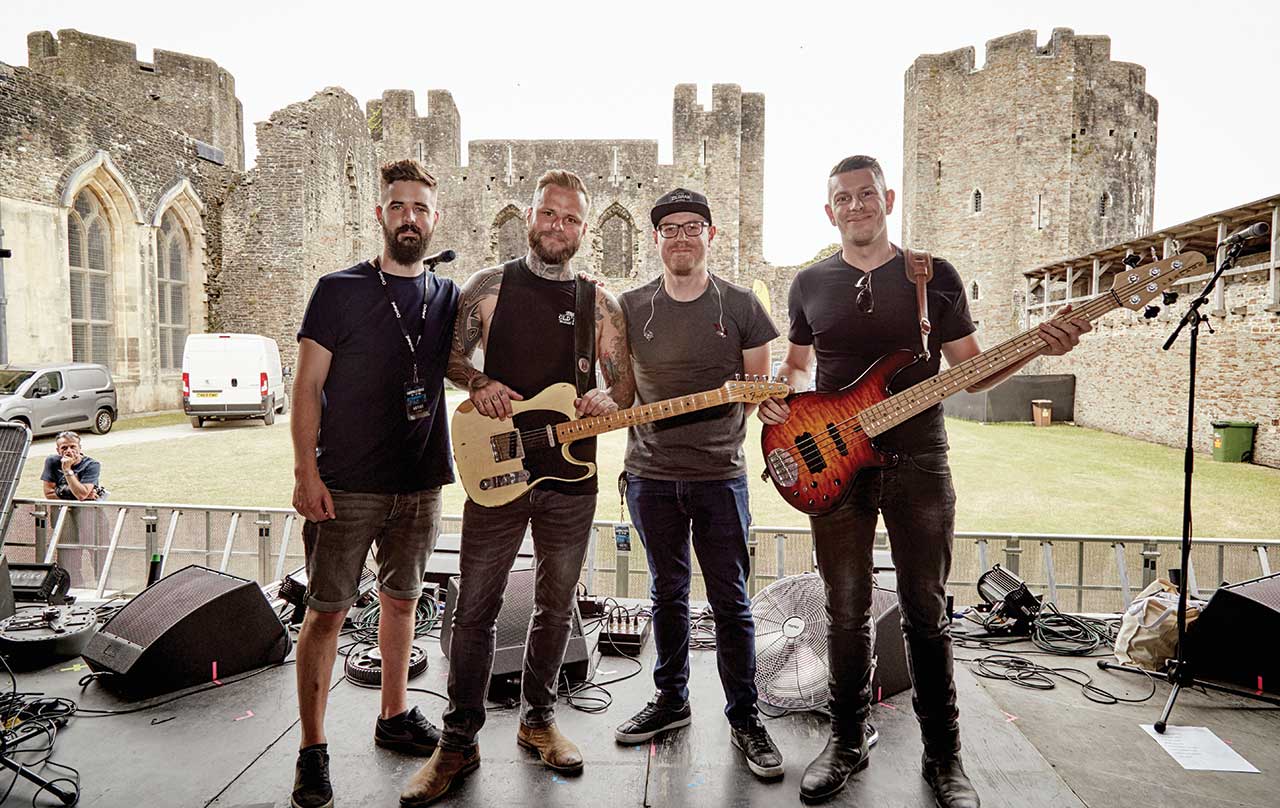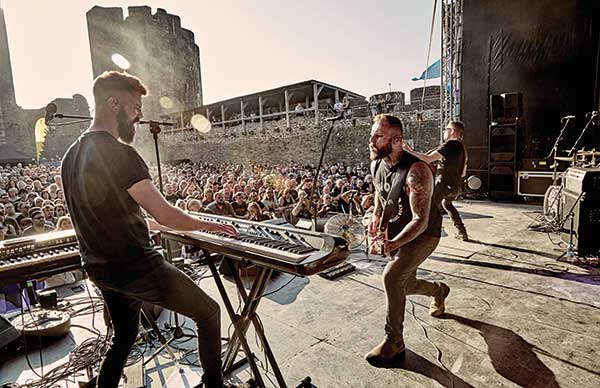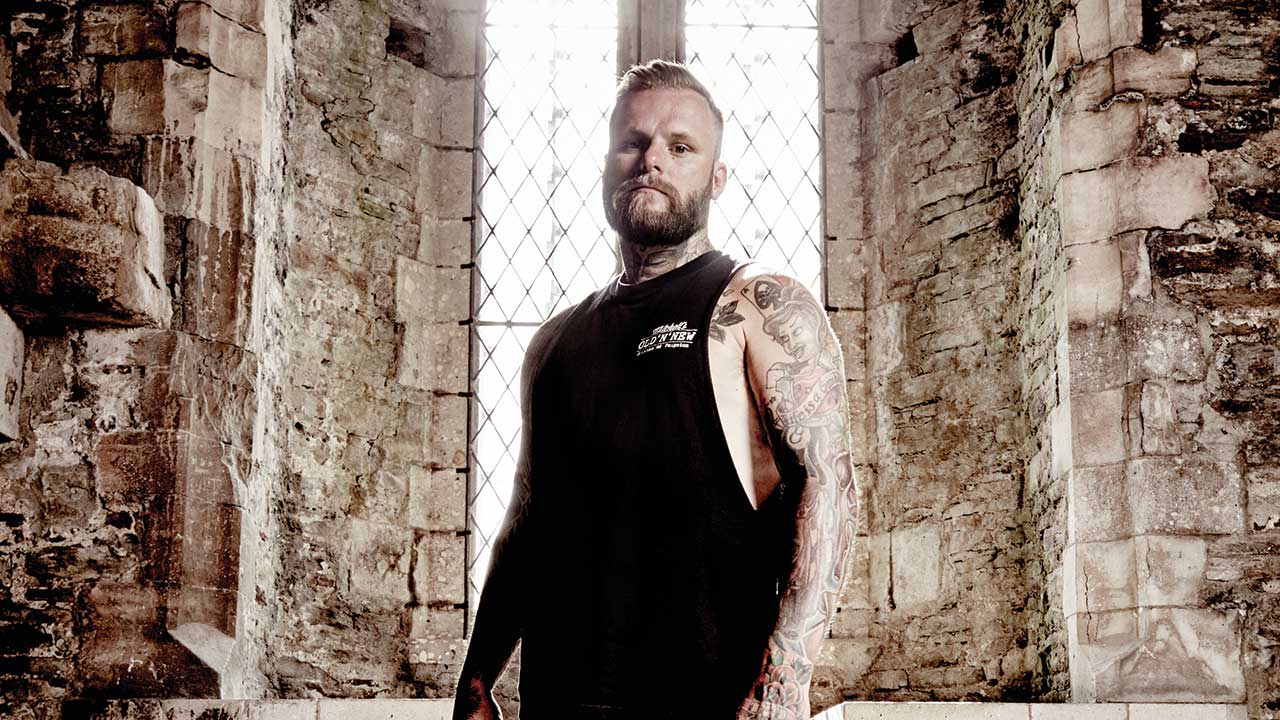It’s a summer evening at a biker festival in Germany. The beer is flowing, the atmosphere is upbeat, and the crowd are gagging for the artist soon to arrive on stage. Little do they know that said artist, Kris Barras, will end up almost killing the front row. Well, sort of.
Reeling from all the good vibes and a few too many strong local brews, Barras and his band play a killer show. Confident on stage at the best of times, tonight the singer/guitarist is practically flying already, so decides to take it up a level.
“I was loving it, I was having the best gig of my life,” the 33-year-old enthuses later. “On the last song, I decided I was gonna do a stage dive –and the front row was all middle-aged women! And I just fucking jumped. I tried to call people forward, a trick I learned off Ty [Taylor] from Vintage Trouble, but they were a bit confused and…”
He laughs, a broad grin flashing through a neat sandy beard. This Kris Barras is much softer than the steely, ‘game face’ version conveyed in the media, honed in part by years as a professional MMA (mixed martial arts) fighter. As we discover during a couple of days on the road with Barras and co, he moves between the two.
“So yeah, I killed the front row. With my ass,” he finishes. “I was a little bit sick off stage after.”
That was your first and only stage dive?
“Yeah, but I loved it. I’d do it again.”
Kris Barras is not just a guy who plays guitar and sings. He writes all his own songs. He edits and/or shoots all his own videos and promos. He handles merch and funding. More often than not he drives the tour van.
On top of all that he fronts the Supersonic Blues Machine with ZZ Top’s Billy Gibbons, and does filming work on the side – shooting music videos, live sessions, mini-documentaries on fighters…
The day before we meet, he was shooting a wedding. “That’s my chill time,” he says, smiling. “I enjoy filming. That stuff is easy to fit around touring, so it’s the perfect side hustle. It’s not like I’m Quentin Tarantino, but I’m a, what’s the word… pro-am.”

Barras’s past life as a professional MMA fighter (also often referred to as cage fighting) is well documented, and until last year he was still involved as a trainer. He’s still built like a fighter – with tattooed biceps to rival those of The Rock – but insists he’s “much less healthy” when on tour.
We’re on a tour bus right now, his band’s home for the next few days, driving from Birmingham to Caerphilly Castle in Wales. They’re playing a series of UK shows with Black Stone Cherry, and every spare inch of the bus is crammed with kit, although we do all have space to sit back and chat over coffee – soundtracked by Mike the driver singing along to Cyndi Lauper’s True Colours on the radio.
Somehow Kris Barras got pigeonholed as a blues guy. He sort of is; he’s signed to the same label as Joe Bonamassa, Eric Gales and Walter Trout. Gary Moore was his first guitar hero (the influence of his late father), and the influences he name-checks typically include blues-based A-listers like Howlin Wolf, Stevie Ray Vaughan, BB King...
When people say: ‘Are you nervous?’ it’s got such negative connotations. But it’s a natural response: fight or flight
Kris Barras
But on the strength of his new album, Light It Up, the Black Stone Cherry billing makes a lot of sense. It’s a rock album with lip-smacking immediacy and a vivid sense of all the genres Barras has studiously absorbed.
There’s southern crunch and bluesy bite in What You Get, heavy rock in Ignite, and Richie Kotzen-esque fusion flourishes in Not Fading, a reminder of his younger days as a highly technical guitar teacher on websites like Lick Library and Shred Academy. And the tunes are spot-on throughout. The joyous Counterfeit People in particular says ‘arena rock star’ more than ‘weekend blues warrior’.
“Traditional blues fans don’t like me anyway,” Barras says, spinning an NFL ball in his hands as our bus winds through Caerphilly’s tiny streets. “There’s people that do it a lot better than I do. They don’t need more 12-bar, ‘My baby left me’ and all that.”

We pull up, and the bus is unloaded. The castle can be entered only via drawbridges, so gear is transported in vans while band and crew walk. They’re a loyal, tight-knit team, even if Barras concedes he’s not naturally a ‘people person’.
“I’m much more of an animal person,” he muses, showing me pictures of his dogs back home in Torquay. “I have a low tolerance for bullshit. I don’t particularly like social gatherings or large groups of people.”
Most of his best friends are from his cagefighting days, with comradeship found even in queues for first aid after fights. “I fought a Russian guy who didn’t speak English, a Polish guy, a guy from South Korea, but we’d still have some kind of signed language after,” he says. “Some of the most gentle, kindest people I’ve ever met have been people I’ve met through the fighting world. And some of the nastiest people that I’ve ever met have been in the music industry, so go figure.”
Inside the castle grounds, huge mixing desks and staging contrast sharply with 13th-century walls. The dressing room looks like a Robin Hood film set, so our photographer and the band dart between backdrops for pictures.
Growing up in Torquay, Barras was a “mostly As and A*s” grammar school student, gearing up for law school. After GCSEs he got into his first band (having also started fighting as a hobby), gigging at local bars and making a tidy living out of it. At 17 he was driving a BMW into sixth form. Studying took a back seat.
“I was so far behind in my coursework, and one day my drama teacher said to me: ‘You obviously don’t want to be here, why are you here?’” he recalls. “And I said: ‘Do you know what? That’s the best bit of advice I’ve ever been given by a teacher.’”
He left school and got a job in a music shop with a studio underneath. He taught guitar there for a while, before opening his own teaching studio/store in a friend’s drum shop. He was 19.
For a couple of years or so the business thrived. Then, at the end of 2007, the financial crash happened, leaving Barras bankrupt at 22: “We ended up with a fuck-ton of stuff that we couldn’t sell off, I closed the shop, caused me a lot of stress.”
He’s called away for sound-check, and we watch from the battlements.

Come show time the castle grounds fill with punters bearing beers, bottles of rosé and sun cream. Falafel wraps and burgers are sold from food trucks. It feels like a mini-festival, or a really giant picnic. Barras, his wife Harriet, his mum and sister watch the opening act, southern rock band Otis.
Barras’s affable, slick-haired bassist Elliott Blackler and his girlfriend join us. Soon after, we find Barras pacing around the dressing room like a caged lion doing vocal warmups. Does he get nervous?
“I don’t call it nerves,” he says, slightly defensively. “My body knows it’s about to go and do something. I can feel the energy in my hands, my stomach… If I didn’t have that I’d be worried.”
Minutes later Barras and his band are winning over the crowd of predominantly Black Stone Cherry fans.
“Come on! I know it’s ten pound a beer but you’ve gotta be a bit pissed by now!” Barras roars, to whoops that suggest they probably are. Fighter-honed bravado capitalised on, he’s suddenly a fully fledged rock star as they dive into a cover of Zeppelin’s Rock And Roll.
Blackler’s sharp bass chops and spread-legged swagger reflect his old job in a Red Hot Chili Peppers tribute; jazz-honed drummer Will is super-tight; keyboard player/producer Josiah J Manning’s Jon Lord and Dr John influences emerge in deft flashes; everyone’s on the money.
After the gig, Barras heads straight down to the merch stand and signs, shakes hands and hugs until everyone’s happy.

By the time we’re all back on the bus and bound for Aberdeen, everyone’s exhausted, and talking seriously about merch sales. It’s a long way from Barras’s touring experience as a teen, fronting pop-rock barely-a-flash-in-the-pan Who’z In The Room With Norman.
“How the hell did you find that out?!” he reels, to laughter. “But yeah, it was mainly a cover band. No one can ever hear that stuff, it’s fucking horrible. I could win over crowds with my guitar solos and putting on shows, but the songs were crap, my voice wasn’t good enough. I didn’t realise it at the time because I had people around me who were like: ‘Wow, you’re gonna be famous!’ I was eighteen years old. I honestly believed I was going to be a rock star. Wow, you’re the only person to ever bring that up.”
Still, you did end up touring in America and recording an album in Philadelphia.
“That’s right,” he chuckles, head in his hands, revealing the words ‘Boom Boom’ tattooed across his knuckles. “Jesus Christ, Polly, you’re a fucking encyclopaedia of all the shit stuff in my life!”
Quality of the music aside, though, being in the US and playing gigs there must have been an exciting experience for a teenager from Devon?
“It was. But you know what? I took it all for granted,” he sighs. “And it’s one thing I always regretted throughout my twenties when I was doing fight stuff. I mean, we were playing bars, basically. We had a guy who had a bit of money, he loved music, he loved what we did and became our manager. It seems mental now, really. He was a great guy, though. I just took it all for granted. It’s a shame, cos I remember looking back thinking: ‘Fuck…’ I wish I took it all in a bit more. But I’m lucky to have a second shot.”
When that venture died, the opportunities for professional fighting picked up in his twenties, in a way that music didn’t. Intensive training and fights in Thailand, Las Vegas and beyond ensued. He opened his own gym, Fightworx, but still played bluesy rock covers at weddings and pubs. Any wedding gig horror stories?
“Loads.”
Care to share any?
“No,” he says, laughing, before adding: “There’s just incidents, not necessarily that I started, but thatI got involved in.”
He stops, then continues with patient emphasis. “Weddings are vibrant places for people with alcohol. I was a wedding singer, who also happened to be a cage fighter, there were events that happened…”
As he cracks open a Cherry Pepsi, we recall his terse attitude to nerves back at the castle, and can’t help thinking it was Kris the fighter talking.
“When people say: ‘Are you nervous?’ it’s got such negative connotations,” he reasons. “But it’s a natural response: fight or flight. Everyone has that. Fighting highlights this more than anything else. I’ve had guys who are absolute killers in the gym, and then he goes in the cage and he’s like a little fucking house cat. And I’ve felt that. I’m not some invincible guy. You have to harness those feelings and turn it into something positive.”
He estimates that he’s performed with “ten or eleven” different line-ups of the Kris Barras Band. His best friend was their original bassist, but left to pursue family and work commitments. Other past members had similar stories.
“It comes back to ‘If I don’t do it, who does’. I’ve been in bands before, and… When you’re starting out, trying to find four guys that have the same drive and passion and will to succeed and to invest their own money, it’s fucking impossible. So when I started the Kris Barras Band it was like: ‘I write all the songs, it’s gonna be me, I’m gonna have a band, and then the only person who can fuck this up is me.’”
Quiet descends as the tour bus rumbles on. By 1.30am almost everyone is in their bunk. At the front it’s eerily empty. The driver bellows along passionately to Bryan Adams’s (Everything I Do) I Do It For You as we roar on up towards Scotland. Cherry Pepsi cans and bananas lie discarded on the table. In the morning, we leave them and stagger sleepily into Aberdeen airport, and they drive on to the city centre.
A few days later we reconvene in Maidstone. Fresh from a run of Black Stone Cherry-sized audiences, the Kris Barras Band make mincemeat of Ramblin’ Man Fair’s main stage.
Afterwards Barras greets me with a smiley, sweaty hug and produces beers from the fridge of their portacabin. He looks happy, buzzing from a mix of adrenalin and sleep deprivation.
“Yeah, it probably takes about a week and I go into a phase I call ‘Tour Robot’,” he says, grinning, “which is where you’re on complete autopilot and your body completely adjusts to the different times and all that sort of stuff.”
In some ways, much of Barras’s life traces back to one tragedy. In 2012 his father – his longtime music mentor, and the bassist in his old covers band – died suddenly of cancer, aged 54.
Afterwards, Barras “went mental for about a year”.
“Not destructive, massively, but I was kinda like: ‘Right, you only get one life.’ My dad, he got cancer and died six weeks later. As far as we knew he was a healthy man, he worked as a builder. He had a pain in his side for a couple of years. Turns out it was fucking kidney cancer.”
Do you think his death changed you in the long run?
“Yeah, a hundred per cent.”
He pauses, then smiles as if just realising something. “I’ve thought about this a lot, and I don’t think I’d be doing this [music] now if he was still alive. My dad was always massively supportive of my fight career, but he always wished I could do music. And because I’d tried when I was younger, I just didn’t want to try again. He always had this thing: ‘Aahh, man, you should be doing it, you should be big.’ He’d always say things like that.”
He pauses.
“But when you lose someone close to you like that, it really changes how you see the world.”
About two years after his father’s death, he met and fell in love with Harriet. His plans to move to Thailand to concentrate on fighting were abandoned, and the focus shifted back to music. They got married and bought a house. In 2016 Barras released his debut full-length album, Lucky 13. The following year he signed a record deal. And now… Well, here we are.
Before we go our separate ways, I ask what the biggest misconception about him is. He thinks for a minute.
“People see a cage-fighting, tattooed frontman and they think you’re going to be arrogant, confident. But I’m very, very closed until I know someone. I’m quite an introvert, and I think people find that hard to equate with a cage-fighting lead singer/guitarist that runs around on stage playing guitar with his teeth. I love doing that, but not in my personal life.”
Kris Barras is currently on tour. The Kris Barras Band's Top 50 album Light It Up is out now.
Kris Barras Band on tour
Oct 17: Exeter Phoenix Arts Centre, UK
Oct 18: London O2 Academy Islington, UK
Oct 23: Glasgow Oran Mor, UK
Oct 24: Stockton on Tees Arts Centre, UK
Oct 25: Manchester Academy 3, UK
Oct 27: York Fibbers, UK
Oct 29: Dublin Whelans, Ireland
Oct 30: Belfast Empire Music Hall, UK
Nov 07: Leverkusen Jazztage, Germany
Nov 10: Southampton The 1865, UK
Nov 16: Udestedt Winter Blues Festival, Germany
Dec 01: Cleon La Traverse, France
Dec 07: Porthcawl Planet Rockstock, UK
Jul 24: Ebbw Vale Hafod-Y-Dafal Farm, UK

